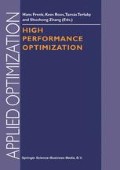Abstract
In this paper, we consider a primal-dual Newton method for linear complementarity problems (LCP) with P *(κ)-matrix. By using some new analysis tools, we prove polynomial complexity of the large update method without using a barrier or potential function. Our analysis is based on an appropriate proximity measure only. This proximity measure has not been used in the analysis of a large update method for LCP before. Our new analysis provides a unified way to analyze both large update and small update methods. The polynomial complexity of the method of finding a maximally complementarity solution is discussed as well.
Access this chapter
Tax calculation will be finalised at checkout
Purchases are for personal use only
Preview
Unable to display preview. Download preview PDF.
References
Cottle, R.W., J.S. Pang and V. Venkateswaran. Sufficient matrices and the linear complementarity problem. Linear Algebra and Its Applications, 114/115:231–249, 1989.
Cottle, R.W., J.S. Pang and R.E. Stone. The Linear Complementarity Problem. Academic Press, Boston, 1992.
Harker, P.T., and J.S. Pang. Finite dimensional variational inequality and nonlinear complementarity problems: A survey of theory, algorithms and applications. Mathematical Programming 48:1990, 161–220.
Illés, T., J.M. Peng, C. Roos and T. Terlaky. A strongly polynomial rounding procedure yielding a maximally complementarity solution for P*(κ) linear complementarity problems. To appear in SIAM Journal on Optimization.
Jansen, B., C. Roos, T. Terlaky and J.-Ph. Vial. Primal-dual algorithms for linear programming based on the logarithmic barrier method. Journal of Optimization Theory and Applications, 83:1–26, 1994.
Ji, J., F. Potra and S. Huang. A predictor-corrector method for linear complementarity problems with polynomial complexity and superlinear convergence. Journal of Optimization Theory and Applications, 84:187–199, 1995.
Kojima, M., S. Mizuno and A. Yoshise. A polynomial-time algorithm for a class of linear complementarity problems. Mathematical Programming, 44:1–26, 1989.
Kojima, M., S. Mizuno and A. Yoshise. An O(Math) iteration potential reduction algorithm for linear complementarity problems. Mathematical Programming, 50:331–342, 1991.
Kojima, M., N. Megiddo, T. Noma and A. Yoshise. A unified approach to interior point algorithms for linear complementarity problems, volume 538 of Lecture Notes in Computer Science. , Springer Verlag, Berlin Germany, 1991.
Mangasarian, O.L., and T.-H. Shiau. Lipschitz continuity of solutions of linear inequalities, programs and complementarity problems. SIAM J. Control and Optimization, 3(25), 583–595, 1987.
Mizuno, S., and A. Nagasawa. A primal-dual affine scaling potential reduction algorithm for linear programming. Mathematical Programming, 62:119–131, 1993.
Peng, J., C. Roos and T. Terlaky. New complexity analysis of the primal-dual Newton method for linear optimization. To appear in Annals of Operations Research.
Roos, C., T. Terlaky and J.-Ph. Vial. Theory and Algorithms for Linear Optimization: An Interior Point Approach. John Wiley & Sons., 1997.
Väliaho, H. Vmatrices are just sufficient. Linear Algebra and Its Applications, 233:109–129, 1996.
Ye, Y., and K. Anstreicher. On quadratic and O(Math) convergence of a predictor-corrector algorithm for LCP. Mathematical Programming, 62:537–552, 1993.
Ye, Y., M.J. Todd and S. Mizuno. An O(Math)-iteration homogeneous and self-dual linear programming algorithm. Mathematics of Operations Research, 59:53–67, 1994.
Yoshise, A. Complementarity Problems. In: T. Terlaky, ed., Interior Point Methods of Mathematical Programming, 297–367, Kluwer Academic Publishers, Dordrecht, 1996.
Zhao, G.Y. Interior point algorithms for linear complementarity problems bcised on large neighborhoods of the central path. SIAM J. on Optimization, 8:397–413, 1998.
Editor information
Editors and Affiliations
Rights and permissions
Copyright information
© 2000 Springer Science+Business Media Dordrecht
About this chapter
Cite this chapter
Peng, J., Roos, C., Terlaky, T. (2000). New Complexity Analysis of Primal-Dual Newton Methods for P *(κ) Linear Complementarity Problems. In: Frenk, H., Roos, K., Terlaky, T., Zhang, S. (eds) High Performance Optimization. Applied Optimization, vol 33. Springer, Boston, MA. https://doi.org/10.1007/978-1-4757-3216-0_10
Download citation
DOI: https://doi.org/10.1007/978-1-4757-3216-0_10
Publisher Name: Springer, Boston, MA
Print ISBN: 978-1-4419-4819-9
Online ISBN: 978-1-4757-3216-0
eBook Packages: Springer Book Archive

